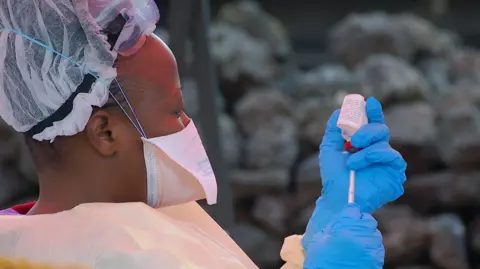The World Health Organization (WHO) has made a landmark advancement by finalizing the text of a legally binding treaty that seeks to improve the world's readiness for future pandemics. The newly established agreement aims to mitigate the chaos and competition for medical supplies witnessed during the Covid-19 pandemic, ensuring a more coordinated global response.
Key highlights of the treaty include mechanisms for the swift exchange of information regarding emerging diseases, allowing researchers and pharmaceutical companies to accelerate the development of effective treatments and vaccines. Moreover, for the first time, the WHO will have oversight of the global supply chains connected to essential medical equipment, such as masks and personal protective gear.
According to WHO Director-General Dr. Tedros Adhanom Ghebreyesus, this treaty marks "a significant milestone in our shared journey towards a safer world." He emphasized that this agreement reflects the efficacy of international cooperation, demonstrating that even amid global divisions, nations can unite against common threats.
The agreement, confirmed early Wednesday, follows three years of deliberations among member states and is only the second international accord of its kind in WHO's 75-year history, the first being a tobacco control agreement established in 2003. Nevertheless, it awaits formal approval at the upcoming World Health Assembly next month.
It is noteworthy that U.S. representatives were absent from the final negotiations following President Donald Trump’s withdrawal from the WHO; thus, the U.S. will not be bound by the treaty's stipulations when it officially exits in 2026.
The treaty mandates that countries ensure adequate access to pandemic-related medications globally during future health crises. Pharmaceutical manufacturers are required to allocate 10% of their vaccine, therapeutic, and diagnostic production to the WHO, with an additional 10% to be provided at affordable costs.
Moreover, the agreement includes the provision for transferring health technologies to developing countries, contingent on mutual consent. This aims to bolster local production of critical medicines during pandemics, a topic that has generated disputes due to prior experiences where wealthier nations procured one-sided amounts of vaccines.
At the heart of the treaty is a proposed Pathogen Access and Benefit-Sharing System (PABS) that facilitates quicker data exchanges among pharmaceutical companies, thereby accelerating drug development efforts in the face of new infectious threats.
Key highlights of the treaty include mechanisms for the swift exchange of information regarding emerging diseases, allowing researchers and pharmaceutical companies to accelerate the development of effective treatments and vaccines. Moreover, for the first time, the WHO will have oversight of the global supply chains connected to essential medical equipment, such as masks and personal protective gear.
According to WHO Director-General Dr. Tedros Adhanom Ghebreyesus, this treaty marks "a significant milestone in our shared journey towards a safer world." He emphasized that this agreement reflects the efficacy of international cooperation, demonstrating that even amid global divisions, nations can unite against common threats.
The agreement, confirmed early Wednesday, follows three years of deliberations among member states and is only the second international accord of its kind in WHO's 75-year history, the first being a tobacco control agreement established in 2003. Nevertheless, it awaits formal approval at the upcoming World Health Assembly next month.
It is noteworthy that U.S. representatives were absent from the final negotiations following President Donald Trump’s withdrawal from the WHO; thus, the U.S. will not be bound by the treaty's stipulations when it officially exits in 2026.
The treaty mandates that countries ensure adequate access to pandemic-related medications globally during future health crises. Pharmaceutical manufacturers are required to allocate 10% of their vaccine, therapeutic, and diagnostic production to the WHO, with an additional 10% to be provided at affordable costs.
Moreover, the agreement includes the provision for transferring health technologies to developing countries, contingent on mutual consent. This aims to bolster local production of critical medicines during pandemics, a topic that has generated disputes due to prior experiences where wealthier nations procured one-sided amounts of vaccines.
At the heart of the treaty is a proposed Pathogen Access and Benefit-Sharing System (PABS) that facilitates quicker data exchanges among pharmaceutical companies, thereby accelerating drug development efforts in the face of new infectious threats.



















